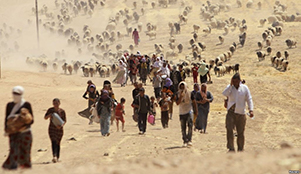03.08.2024

The Yazidis are one of the oldest ethnic and religious communities in the Middle East. Most of them live in northwestern Iraq, and the settlement of Sinjar (Shingal/Shangal) is of great historical importance, as there are dozens of Yazidi shrines and other historically or culturally significant sites in this area.
In the summer of 2014, militants of terroristic entity Islamic State of Iraq and the Levant (ISIL), based in Deir Zor, launched an offensive in northern Iraq, gaining control of a predominantly Yazidi, Christian-populated area approaching Sinjar.
Breaking the Yazidi self-defense, the terrorists of the Islamic State carried out an attack in August, capturing the city of Sinjar and other Yazidi settlements. The terrorist group slaughtered all the Yazidis who refused to convert to Islam in their controlled territories.
In the very first days of the attack, thousands of Yazidis left Sinjar. Some tried to escape by climbing the mountains, but found themselves under siege. Suffering from famine, thirst and unbearable heat, hundreds of victims managed to open a corridor and flee to Syria.
The genocide committed by the terrorist group against the Yazidis since 2014 resulted in the deaths of more than 30,000 Yazidis and the capture of thousands of women and children. Terrorist militants forced many Yazidi women and girls into sexual slavery. More than 400,000 Yazidis became refugees.
At the end of 2015, the Yazidis managed to liberate Sinjar, and the report published by the UN stated that ISIL had committed genocide against the Yazidis.
On January 16, 2018, the Armenian parliament recognized the genocide committed by terrorist groups against the Yazidi people in Iraq in 2014.





